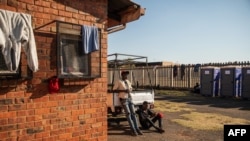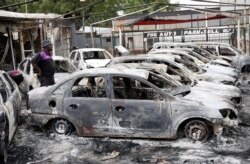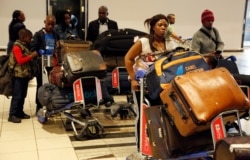Violence targeted at foreign nationals and their properties in South Africa has left hundreds of them displaced from their homes. Nearly 200 of them, including children, are housed at the Tsolo community hall, in Katlehong Township in the city of Ekurhuleni east of Johannesburg.
Children playing, mothers chatting with sad expressions on their faces, while fathers are largely silent or sleeping.
This is the situation at the Tsolo community hall, now home to foreign nationals who were driven out of the Mandela informal settlements by angry local residents early this month.
Fibion Maimbidza, a 38-year-old father of three from Zimbabwe, is still struggling to accept that he is now destitute and has to depend on the mercy of well-wishers.
He rejects what he calls lame excuses given by the locals for chasing them away.
"They came to us and they said, we don't want foreigners here because you cause problems as foreigners. So, we asked them, What problems do we cause here?' They said, you took our wives. You took our jobs and you do nothing here."
Fifty-year-old Polite Moyo, a mother of three from Zimbabwe, had been staying in the Mandela informal settlement for the past four years.
One morning she was told she and other foreign nationals in the area had three hours to leave or else lose their lives. Seeing that locals were already gathering in the streets ready to attack those who disregard the order, she ran, leaving behind all she had worked for.
She says she has no doubt that her property was looted as soon as she left.
"No foundation at all. No foundation, I have got no foundation. I lost my life here."
Malawian national Kenias Banda says the trauma he experienced on the night he escaped the angry residents will haunt him for life.
"I'm a married man. I have got a wife and a six-months-old baby. So, I had to carry my baby, in my hand to run away during the night around two o'clock mid-night because it was just like we are in a war zone."
Others weren't able to escape. Isaac Sithole Mabandla from Zimbabwe was cornered by the locals while trying to run away. He was beaten to a pulp and burnt to death, one of the 12 people who have died in the violence.
Hundreds of foreign nationals who are now fearing for their lives have asked their embassies to repatriate them back home.
A Nigerian national who asked to be identified only as Nicholas was in the first group of Nigerians to leave South Africa.
"It's better I rather die in my country than dying in your South Africa country like if I'm crazy. I'm not crazy. I'm not happy the way South Africa is treating us. They are treating us bad. I lost my cars. I lost my shop, even my equipment. I lost everything."
The government has condemned the attacks and vowed to bring them to an end. Hundreds have been arrested. However, for most of these foreign nationals, this is too little too late.






